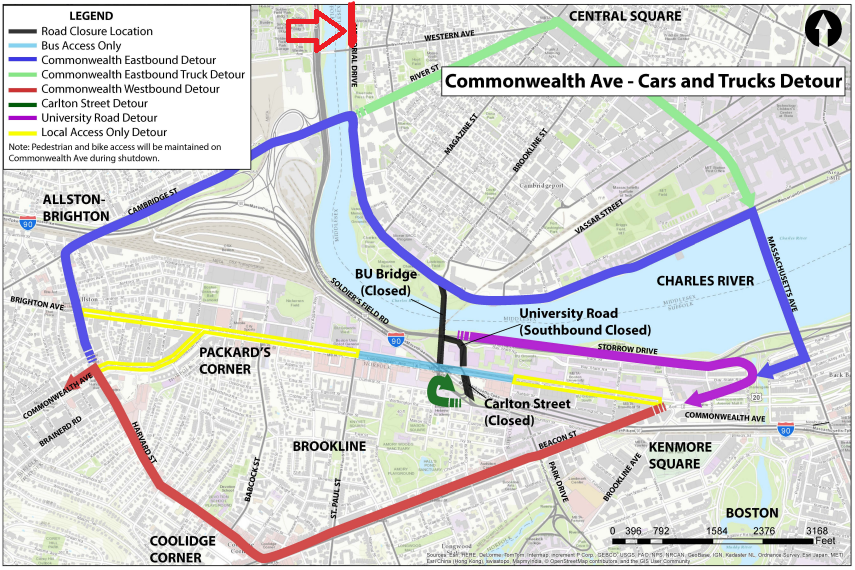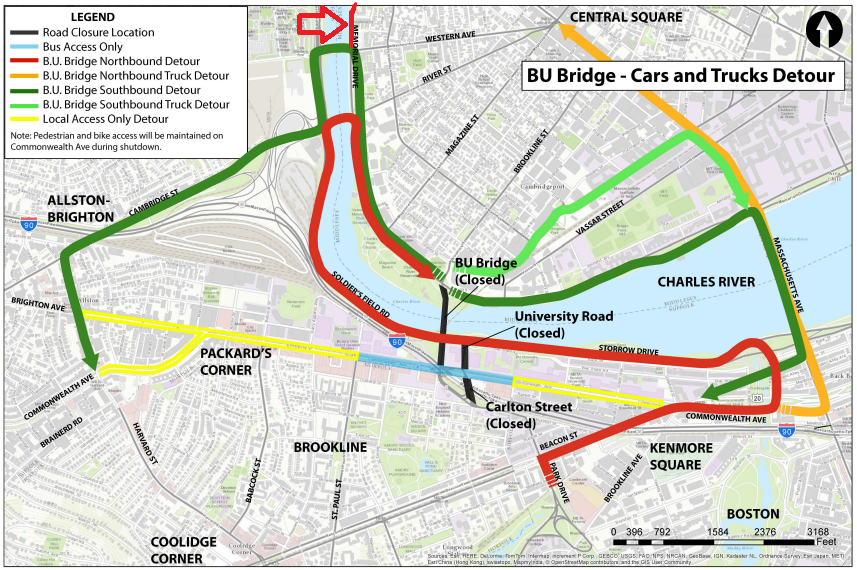If you’re going to close a park for a highway project, you better have a damn good reason for it. MassDOT’s reasoning for closing Riverbend Park this summer in Cambridge doesn’t even come close.
Here is a letter John Hawkinson obtained which MassDOT sent to the DCR asking them to keep Memorial Drive open in Cambridge for two Sundays. This letter was never made public, and at no time has MassDOT’s public traffic management plans stated that Riverbend Park would be closed. The letter does not clearly cite a threat to public safety as would be required by state law. In addition, it does not even mention any mitigation for the temporary removal of parkland to satisfy federal 4(f) regulations. None of this has been this mentioned in any MassDOT traffic management plan: the idea was to keep it quiet until the last minute.
This is unacceptable.
The letter does not remove any doubt that there was no thought given to this by MassDOT, just a reaction that more roads are always the solution. This is wrong. The third paragraph of the letter gives the rationale for requesting the removal of this park. The reasons given are:
“The approved traffic management plan requires the use of Memorial Drive as a detour route for both automobiles and MBTA buses throughout the duration of the shutdown.”
However, none of the portion of Memorial Drive used for the detour is affected by the Riverbend Park closures on Sunday. I’ve taken the liberty of adding big red arrows showing the southern extent of the Riverbend Park closure overlaid on MassDOT’s traffic management plan:
Anyone see the problem here? I sure don’t. It seems that all of the detours take place away from the area which is closed on Sundays. The only portion possibly affected would be one half of the BU Bridge southbound detour, except that is adjacent to the portion of Memorial Drive closed. The Riverbend Park closure would actually improve conditions for this portion of the detour, since cars making a left from Memorial Drive to Western Avenue would have the entire green cycle to make the turn, from both lanes, since there would be no oncoming traffic.
Yet there have been no traffic studies or traffic counts.
The “rationale” continues:
“It is important that Memorial Drive remains open to all vehicular traffic during the above requested dates to ensure the smooth, orderly and safe routing of traffic around the limits of the project.”
It is true that we need to have safe, orderly traffic! But Riverbend Park does not affect the portions of Memorial Drive affected by any traffic detour. In fact, by closing Memorial Drive, some drivers may choose to avoid the area altogether, reducing traffic in the project area and reducing congestion.
There is simply no explanation for MassDOT requesting that DCR keep Memorial Drive open, and Riverbend Park closed, during the Commonwealth Avenue Bridge project. With more construction upcoming in the area, we need to make sure that MassDOT has a very high standard for any adverse impacts to parkland. In this case, they have failed to meet such a standard.
Call your Representatives, call your Senators, and demand that Riverbend Park remain OPEN.
Update: I received a response to a call placed to MassDOT. The general process, which apparently happened behind closed doors, was as follows: someone from the “public safety” community asked that the road remain open. MassDOT, without any data or modeling (I asked if any existed and was told that it did not), decided that it was, in fact, a public safety issue, and requested that the DCR keep the roadway open. There was no public process, and the letter only cites the “smooth, orderly and safe routing of traffic,” saying nothing about emergency vehicles.
It turns out, reading the letter closely, MassDOT doesn’t even know where the park is. They request a suspension of “the ban of the use of motor vehicles on Memorial Drive between Western Avenue and Mount Auburn Street.” Yet Riverbend Park extends between Western Avenue and Gerry’s Landing Road; it runs parallel to but never intersects Mount Auburn Street. This is a small oversight, but shows how little mind was actually paid to this issue.
The staffer I spoke with mentioned that it would impact emergency vehicle access to Mount Auburn Hospital (which is not accessed from Memorial Drive) and to the LMA. If there were traffic, then emergency vehicles could use Memorial Drive by moving barricades (this could be staffed by state police traffic details) and then use the BU Bridge, which will be open to buses and emergency vehicles. But that wasn’t brought forth as an option, there was no process involved, and instead the “close the park” was put forward as a solution, one still looking for a problem.


